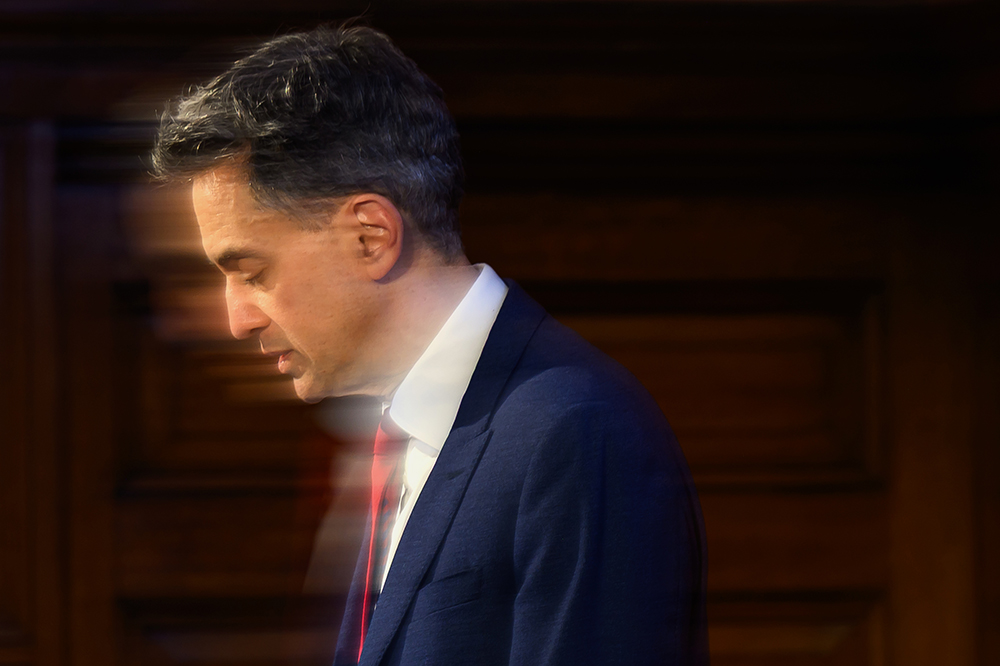
With three weeks until the Budget, the main political parties have been setting out their economic thinking. Each faces the same bind: anaemic growth, fiscal constraints and uncomfortable exposure to the bond markets. The upshot is that there is less ‘clear blue water’ on the economy between Labour, the Conservatives and Reform. Even Sir Mel Stride, the shadow chancellor, irritated some colleagues by appearing to suggest he would raise income tax if he were in Rachel Reeves’s shoes at his party’s conference. ‘It’s a good job no one is listening to us,’ jokes a fellow frontbencher.
If the economy is less of a dividing line in British politics, what might take its place? Energy is one possibility. On one side of the House of Commons is ‘red Ed’ Miliband, the ex-Labour leader turned champion of the green movement. On the other is Claire Coutinho, the ex-KPMG policy wonk who preceded Miliband as energy secretary. ‘The exchanges are a proper ideological ding-dong,’ remarks one MP. ‘Their positions are both really entrenched.’
It is striking just how many British political crises can be traced back to energy policy
It is striking just how many British political crises can be traced back to energy policy. From the coal shortage of 1946 to the oil shock of 1973, the petrol panic of 2000 up to Liz Truss’s unfunded promises of 2022, fluctuations in energy production and supply can prove fatal to a government. For Miliband, the answer is renewables. To his fans, he is the ‘happy warrior’, championing the ‘green and pleasant land’ of which Clement Attlee spoke when he promised a ‘new Jerusalem’ more than 70 years ago.
Miliband’s mission is for clean power to meet 95 per cent of Britain’s electricity demand by 2030. It is an ambitious target; currently it is just 60 per cent. ‘Pessimism never won a single fucking victory,’ he declared joyously at Labour conference. He rolled off achievements in his speech: ‘Ten thousand new jobs’ at the Sizewell C power station; ‘enough solar to power two million homes’; ‘the first publicly owned energy company in 70 years’. Miliband has become the favourite minister of the party faithful, according to polling by Labour List.
Yet, to his critics, his ambitious vision comes at a cost – to those paying bills and taxes. With cost of living at the forefront of his fellow Labour MPs’ minds, Miliband has achieved an obvious success as one of the few ministers able to drive his agenda through Whitehall. But this risks painting a target on his back. Some MPs have duelled with him publicly, including Sarah Champion on solar panels made in China. Others privately share the concerns of Tony Blair, who has warned of voters being ‘asked to make financial sacrifices [when] their impact on global emissions is minimal’.
Senior government figures have been warned that the £300-a-year reduction in energy bills promised at the last election will never materialise. Coutinho is determined to hang this claim around Miliband’s neck: she is set to launch a ‘Cut My Bills’ campaign, citing 20 per cent reductions by axing the carbon tax on electricity generation and scrapping old wind subsidies. It is a crusade that Tory leader Kemi Badenoch is embracing with relish. As Keir Starmer jetted off to the Cop 30 summit in Brazil, she headed to Scotland to stand with oil and gas workers hit by the moratorium on new licences.
It fits with a shift in Tory thinking since 2020, when Boris Johnson promised to make Britain the ‘Saudi Arabia of wind’. With borrowing costs soaring and demand for energy-intensive AI on the rise, senior figures believe policy must match economic reality. One Tory MP criticises the tenor of Labour MPs’ comments in parliament: ‘It is a very 2010s debate that doesn’t really reflect the reality now.’ Some of the Tories’ most prominent net-zero advocates – Chris Skidmore, Theresa May, Alok Sharma – quit the Commons last year. The Conservative Environment Network caucus still boasts 49 MPs but has been quiet since criticising Badenoch’s decision to drop the 2050 net-zero target.
Green Tories accept her changes – but worry about a vacuum caused by jettisoning previous guarantees. One points to the announcements she made at party conference on leaving the European Convention on Human Rights and repealing the Climate Change Act: ‘On the ECHR, fair enough. But the climate announcement seemed to come out of the blue.’ The Liberal Democrats are keen to seize on any suggestion that Badenoch is abandoning her traditional communitarian voters. ‘We will use everything at our disposal,’ warns one senior Lib Dem aide.
Reform meanwhile is happy to mount an all-out war on what its deputy leader, Richard Tice, has called ‘net stupid zero’. He has pledged to tax solar farms and rip up green energy contracts if his party wins power – to the fury of Labour MPs. His colleague, Zia Yusuf, wants more small-modular nuclear reactors, citing industrial energy costs being four times higher in the UK than in the US.

For Miliband and his allies, the challenge will be to show that his mission is a net benefit, not a net cost. One unstated argument by this government – forever paranoid of antagonising Donald Trump’s allies – is the hope of attracting green capital seeking to relocate from the US. Others make an explicitly political case, warning that junking his agenda risks alienating progressive waverers. ‘We might need them come 2028 or 2029,’ admits one ex-minister. Zack Polanski’s Green party hopes to inflict serious damage at the London local elections in May, with plans for informal pacts with some Lib Dems.
So far Rachel Reeves has remained onside with Miliband, handing him the biggest departmental spending increase in the recent spending review. But she is keen to get energy costs down in the Budget – with funding cuts for more energy efficient homes potentially on the cards. Her junior minister, Dan Tomlinson, this week suggested the energy profits levy could be overhauled – to the delight of Scots in oil-producing seats.
The climate consensus, which began to fray after Covid, appears to be coming apart. Abroad, influential figures like Bill Gates are shifting to a more nuanced picture on global warming; at home, polls suggest voters care more about the price of energy than its source. With costs set to remain stubbornly high, this is likely to remain a running battle for the rest of this parliament.








Comments